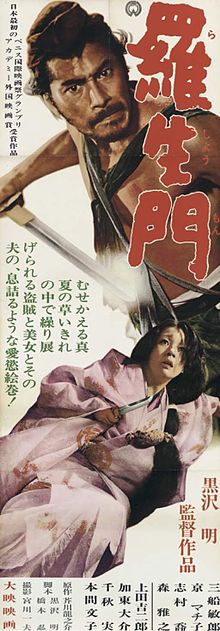Oscar History: Best Foreign Language Film Oscar, 1947-Present
Rashomon was the fifth winner of the Best Foreign Language Oscar
Rashomon, directed by Akira Kurosawa, is one of the first classics in international film history. While the film introduced the master director Akira Kurosawa to the world, it did even more than that: “Rashomon” introduced Japanese cinema itself to the world. Brilliantly constructed, the film is justly regarded as innovative, and even experimental in its display of various points of view and open approach that gives freedom to viewers’ alternate readings.
| Rashomon | |
|---|---|

Japanese poster from 1962 re-release
|
|
Although Japan’s film history dates back to the end of the 19th century, it was not until “Rashomon” distribution in the early 1950s that the West suddenly “discovered” Japanese cinema and its great film artists, including Ozu, Mizoguchi, and of course Kurosawa. As a result, Japanese cinema, in all of its rich varieties, became popularized and accessible in the Western world.
“Rashomon” was almost never made. The production was canceled twice, but finally taken up with reluctance by the Daiei Company. his was due only to young Kurosawa’s relentless personal campaign. Entered by Daiei in the Venice Film Festival of 1951, with little expectations, Rashomon captured the top honors to everyone’s surprise and Kurosawa’s immense joy.
The film is famous for its relativist view of truth and morality. The narrative, set in the Heian period of Japan’s history, centers around a mysterious criminal act that occurs one day in the depths of a forest. The incident involves the violent confrontation of three people: an animalistic bandit, played by Toshiro Mifune, and a traveling married couple. Although exactly what happens remains forever uncertain, the encounter leaves the husband dead. We are told the story from each of the involved parties’ wildly differing perspectives, a compelling device which has often been repeated since. Each character’s account differs so greatly, both in details and in cinematic style, that a clear verdict is impossible.
Ultimately, “Rashomon” is more about human fallibility, dishonesty, and self-centeredness, than absolute morality or the notion that there is such a thing as one objective truth.
Kurosawa, originally a painter, entered the film business at age 26 to support his parents after both his brothers died. He is widely acclaimed as one of the greatest directors of our age. His films include Ikiru (1952), Seven Samurai (1954), Throne of Blood (1957), Dersu Uzala (1975), and Ran (1985).
Oscar Alert
Oscar Nominations: 1
Art Direction-Set Decoration (B/W): So Matsuyama and H. Motsmoto
Oscar Context:
The winner was Minnelli’s Hollywood melodrama, The Bad and the Beautiful, which received most of the b/w technical awards that year.
Cast
Tajomaru (Toshiro Mifune)
Masago (Machiko Kyo)
Takehiro (Masayuki Mori)
Firewood Dealer (Takashi Shimura
Priest (Minoru Chiaki)
Commoner (Kichijiro Ueda)
Medium (Fumiko Homma)
Policeman (Daisuke Kato)
Credits
Produced by Jingo Minoura.
Directed by Akira Kurosawa.
Screenplay: Shinobu Hashimoto and Akira Kurosawa, based on the short story “Tabu no Naka” and the novel “Rasho-Mon,” by Ryunosuke.
Camera: Kazuo Miyagawa,
Music: Fumio Hayasaka.
Art Direction: So Matsuyama and H. Motsmoto
Running time: 90 Minutes; also 88 minutes
Release: August 25, 1950




